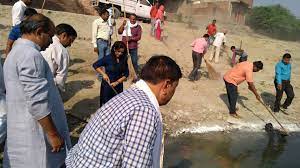A Tongue-in-Cheek Reality Check
The Swachh Bharat Abhiyan (SBA), launched with great pomp and ceremony in 2014, aimed to transform India into a ‘clean’ nation by 2019. However, recent data from the National Family Health Survey (NFHS) reveals a stark reality: open defecation remains prevalent in many rural areas, particularly in states like Bihar, Madhya Pradesh, Rajasthan, and Uttar Pradesh.
A Comparative Analysis with Neighboring Nations
Assessing Progress: India vs. Bangladesh and Nepal
While India struggled to curb open defecation, Bangladesh and Nepal made significant strides in improving sanitation infrastructure. By the time SBA was initiated, open defecation was virtually eradicated in Bangladesh, and Nepal achieved remarkable success in constructing improved toilets in households.
The Discrepancy Amidst Economic Growth
Unveiling the Disparity: Economic Growth vs. Basic Amenities
Despite India’s economic growth and technological advancements, the reality in rural areas paints a grim picture of deprivation. While the media celebrates India’s financial progress and digital revolution, millions still lack access to basic necessities like proper sanitation facilities.
Insights from Swati Narayan’s Research
UnEqual: A Journey into India’s Development Challenges
Swati Narayan’s book, UnEqual: Why India Lags Behind Its Neighbors, offers profound insights into the factors hindering India’s development. Through meticulous research and grassroots narratives, Narayan delves into the complexities of India’s socio-economic landscape.
Identifying Root Causes and Solutions
Addressing Social Inequalities and Policy Gaps
Narayan’s analysis highlights the role of social awareness, gender equality, and affordable solutions in Bangladesh and Nepal’s progress. Meanwhile, India grapples with deep-rooted inequalities and ineffective policy implementation, hindering its development goals.
A Call for Action
In conclusion, the disparity between India’s economic growth and the persistence of basic amenities challenges us to reevaluate our development strategies. Narayan’s work underscores the need for inclusive policies and concerted efforts to address social inequalities and ensure widespread progress.




